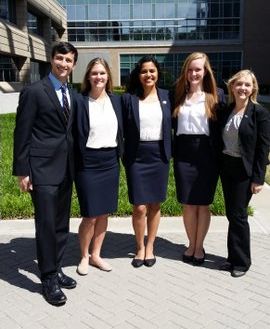 In their senior year, all students in the Bachelor of Science in Public Policy program enroll in a fall/spring capstone project sequence. In Policy Task Force, they apply the knowledge and skills from their core and elective courses, internships, and other experiences to address a current policy problem faced by a government agency, not-for-profit organization, or business firm. These organizations need real-time and expert analysis.
In their senior year, all students in the Bachelor of Science in Public Policy program enroll in a fall/spring capstone project sequence. In Policy Task Force, they apply the knowledge and skills from their core and elective courses, internships, and other experiences to address a current policy problem faced by a government agency, not-for-profit organization, or business firm. These organizations need real-time and expert analysis.
Under the guidance of two faculty facilitators and occasional client input, and with advice as needed from the public policy faculty and others at Georgia Tech and beyond, the students prepare a detailed analysis of the client's problem; formulate alternative solutions; analyze their benefits, costs, and effectiveness; identify the most useful and practical approach; and prepare a professional written report and team presentation to the client. Projects such as this occasionally are conducted in graduate policy programs. The undergraduate program at Georgia Tech is unique in its approach to preparing students for professional jobs and graduate study with a senior-level project that, in many cases, has an actual impact in the policy arena.
Call for Projects
The Task Force faculty are always looking for clients with two-semester projects for our students. Every year we seek five projects to be worked on by groups of six students. All client interactions can be over Zoom.
Eligibility and Requirements
There are a few things potential clients should know.
- The project runs from mid-August until late April. The students need all of that time to complete the project and to be able to learn from it.
- This is a learning experience for undergraduate students, which means you should expect undergraduate-level work. The instructor is there as a guide, not as a participant in the project. There is a possibility that the students will fail to produce a usable product. We will let the students (individually or as a group) fail if they do not produce adequate work. No one will step in to “save” the project. Thus, we counsel our potential clients not to propose operationally critical work.
- Nevertheless, we ask that the proposed project be important enough that you are sufficiently committed to seeing it through and interacting with the students when necessary.
- We expect clients to:
- Attend sessions with the students at three times: at the beginning of the project, typically in late August/early September so that the students have an opportunity to hear directly from you about the project and to ask clarifying questions; in late November/early December to hear and give feedback on the project design (after this stage clients will not be allowed to change any core elements of the project); and at the beginning of April for the final project roll-out, where the students present results. Any or all of these meetings can be virtual.
- Be available via email to the students to answer questions along the way.
- Provide any data to be analyzed by mid-December.
- Provide feedback to students on formal reports (December and April).
- Have a designated point person for the students to contact.
Once the initial conversation occurs with the instructor(s) and the decision is made to move forward, we need from you a one- to two-page project description that provides the following: background on the project, why it is important to the organization, and what questions you need answering. We do not move forward on committing to any clients without this brief proposal. Typically, we will provide feedback on the submission, and will let you know whether we can accept your proposal. Determinations are made based on skillsets of students, the feasibility of the project (generally and within the course constraints), and the clarity of the project goals.
If you are interested in being one of our partners, please contact Diana Hicks (dhicks@gatech.edu) to begin the process. We would expect to have one or two Zoom meetings over a couple of weeks to work through scope conditions. Although we keep the process fairly informal, it is vital to set up appropriate expectations for both partners. There is a small fee for participating organizations.
